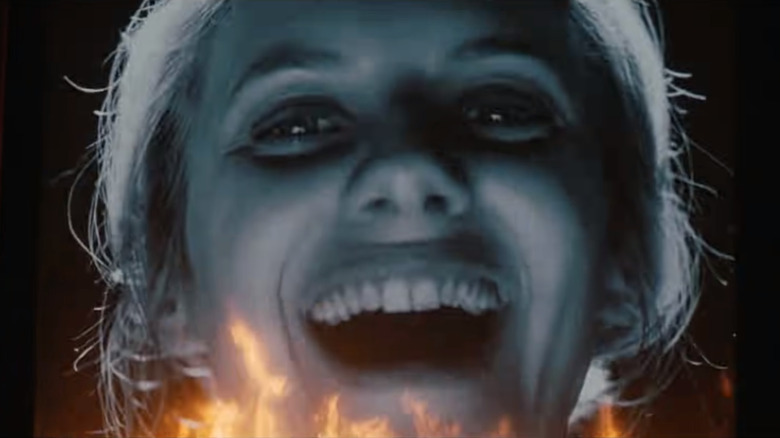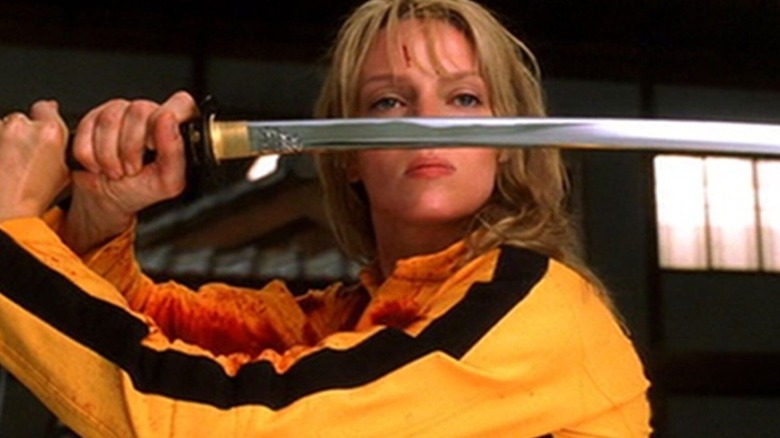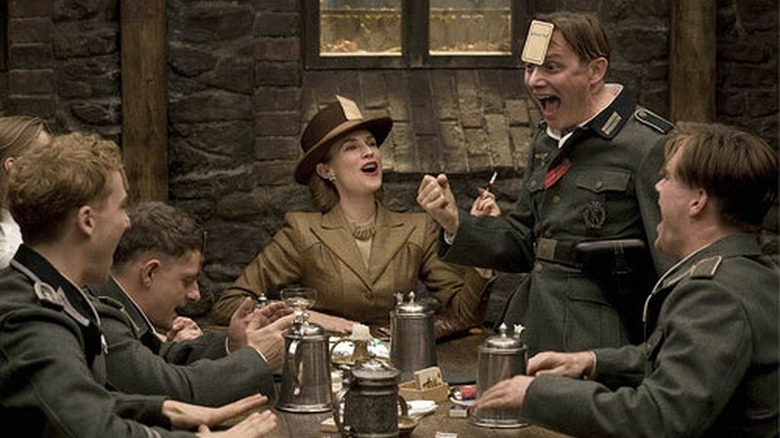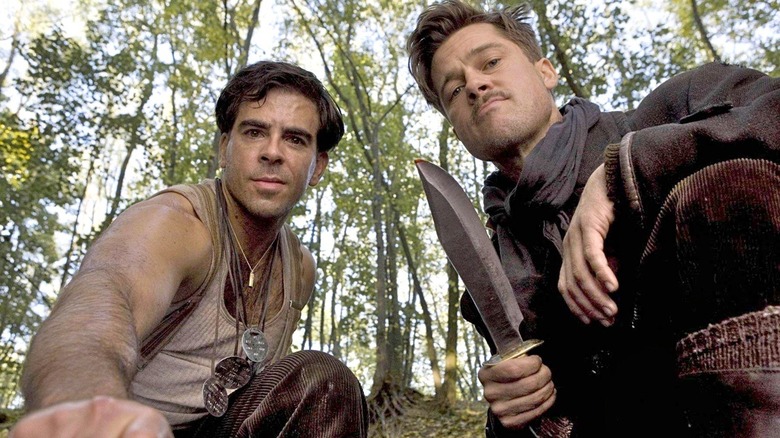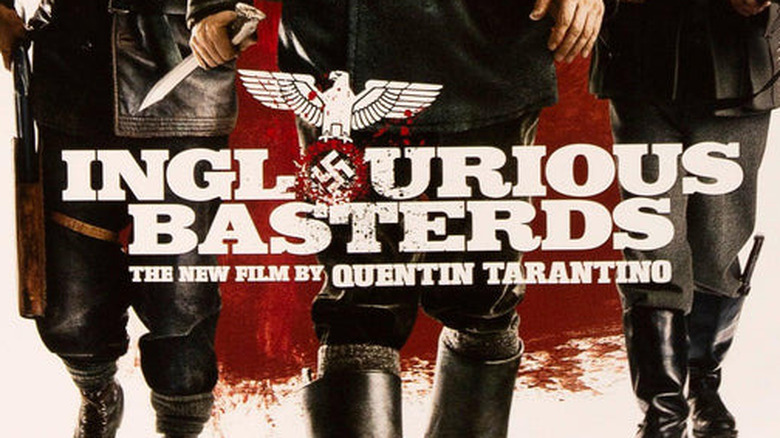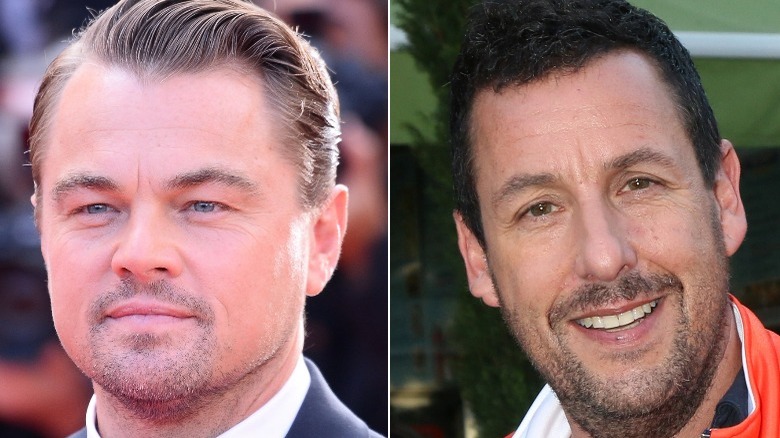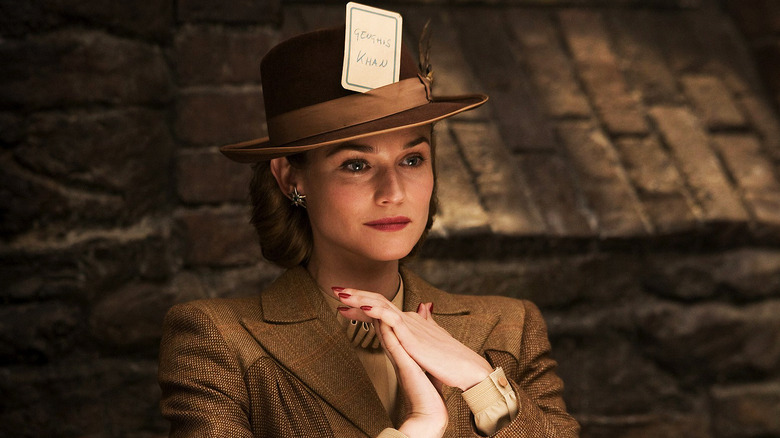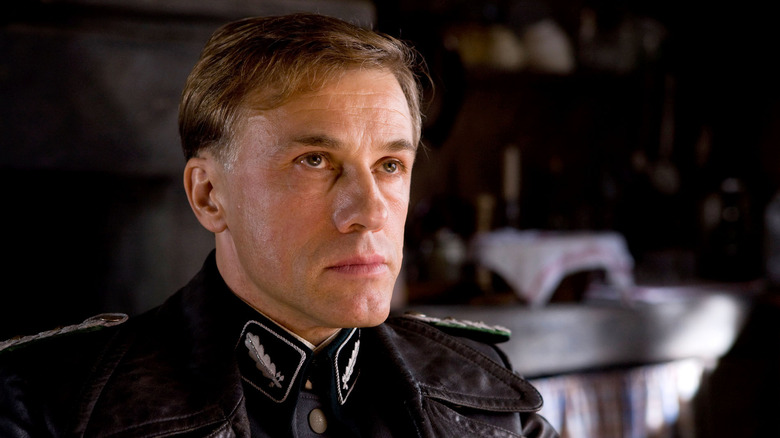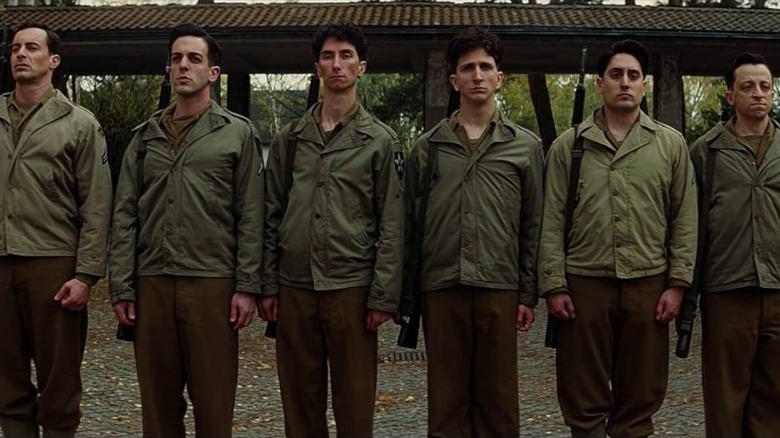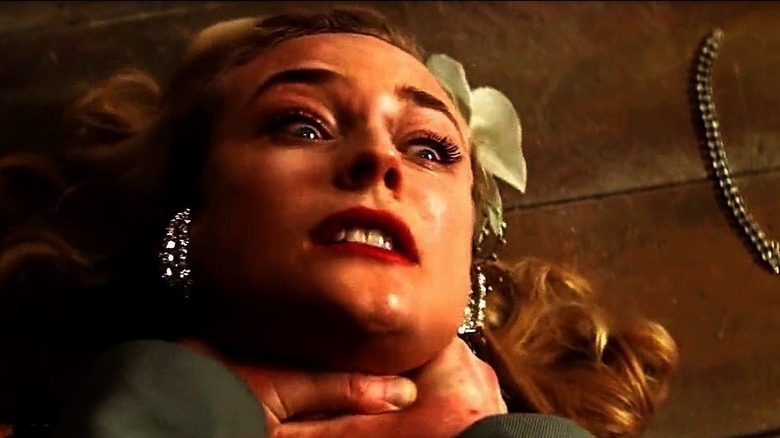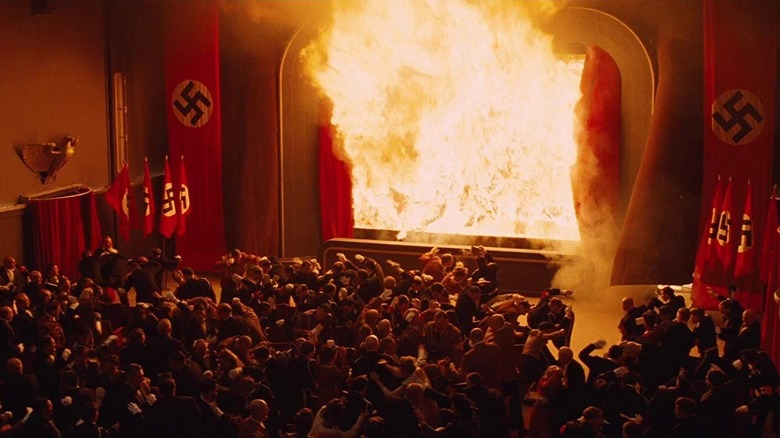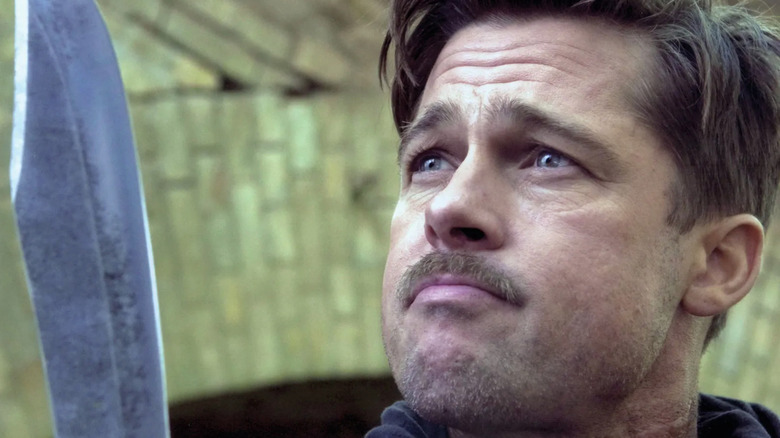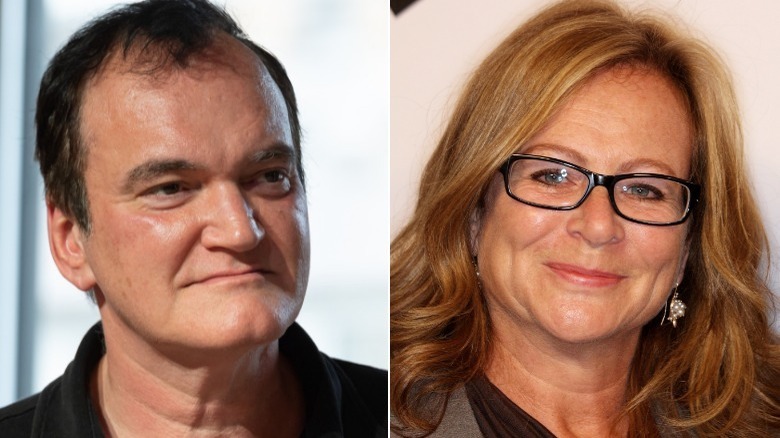The Untold Truth Of Inglourious Basterds
Few films could get away with an ending where a character turns to the camera and says, "This might just be my masterpiece," but "Inglourious Basterds" might truly be Quentin Tarantino's masterpiece. An irreverent alternate history following two intersecting plots of Jews taking violent revenge against the Nazis (one by an orphaned French theater owner named Shosanna, the other by an American GI squad known as the Basterds), Tarantino's sixth film became the director's biggest hit up to that point in the summer of 2009. It was nominated for eight Academy Awards including Best Picture, and won Best Supporting Actor for Christoph Waltz, who played the villain Hans Landa. It's aged well, winning IndieWire's critics' poll for the best Tarantino movie a decade after its release.
A masterpiece like "Inglourious Basterds" takes a lot of work to get right. Tarantino worked on the script for years, made tough decisions in casting the film, and took time to get the final cut just right. During the movie's production, however, there were also serious risks and conflicts that could have (and probably should have) been avoided. These are the untold truths of the making of "Inglourious Basterds."
The script was being written before Kill Bill
Between "Jackie Brown" in 1997 and "Kill Bill Vol. 1" in 2003, there were seven long years without a single new Quentin Tarantino film. However, that doesn't mean the provocative auteur was taking a break from work; he was keeping busy writing scripts. As reported in The New York Times, Tarantino had intended his follow-up to "Jackie Brown" to be a World War II epic then titled "Inglorious Bastards" (with proper spelling).
Part of the reason Tarantino decided to make "Kill Bill" first was due to the fact the story for his epic was growing so large in scale that he was having trouble cutting it down. There was also the issue of competition: other great directors were also doing World War II epics in the late '90s, notably Steven Spielberg with "Saving Private Ryan" and Terrence Malick with "The Thin Red Line." "Kill Bill" offered a fun break from the not-quite-ready project and a chance to reunite with "Pulp Fiction" scene-stealer Uma Thurman.
It almost became a TV miniseries
Tarantino's movies tend to be on the longer side, with many of them running close to three hours. As much as he packs into these movies, however, their scripts often run even longer. The "Inglourious Basterds" screenplay was a particular challenge both to write and to edit down into a workable feature. At one point, the writer-director feared it would be too long for a movie and that the epic story would be better suited for a TV miniseries.
Speaking in an interview (via Screenrant) with fellow filmmaker Robert Rodriguez for an episode of "Director's Chair" on El Rey Network, Tarantino said, "People thought I was going through writer's block, you know, I was going through the opposite. I couldn't stop writing. I'd have a 100-page script and no end in sight. So I was trying to keep taming it, and I couldn't ... My idea at the time, because it was just so big and so unwieldy, was to do it as a miniseries, and that really was what I was planning on doing." It was "The Fifth Element" director Luc Besson who encouraged Tarantino to finish "Inglourious Basterds" as a movie rather than a miniseries. Tarantino would later reedit his movie "The Hateful Eight" into a miniseries for Netflix.
Similarities with the real Operation Greenup
A movie that climaxes with a group of Jewish soldiers shooting Hitler in the face isn't particularly concerned with historical accuracy, but "Inglourious Basterds" still draws some inspiration from real history. One of the closest comparisons is to Operation Greenup, a spy mission which the National WWII Museum in New Orleans has called "The REAL Inglourious Basterds."
The mission involved two Jewish members of the Office of Strategic Services, Frederick Mayer and Hans Wijnberg, who parachuted into Austria in February 1945 to figure out Germany's battle plans. They were joined by Franz Weber, an ex-Wehrmacht officer turned freedom fighter comparable to the Basterds' Hugo Stiglitz. They didn't end up killing Hitler, but they were able to negotiate the surrender of the German Army in Austria. Meyer is on record of saying he just "wanted to kill Nazis," an attitude paralleling that of the Basterds.
The title's spelling was never fully explained
So how did the title of Tarantino's WWII revenge flick go from "Inglorious Bastards" to "Inglourious Basterds"? Tarantino will never tell us the full logic behind misspelling the title, though in various interviews he's offered partial explanations. At the film's premiere at the Cannes Film Festival, he compared the spelling of the title to an "artistic flourish" by an artist like Jean-Michel Basquiat, saying (via Today), "If he describes why he did it, he might as well not have done it at all." In an article about the film in The Guardian, Tarantino is quoted as refusing to explain the "u" in "Inglourious" but does explain the "e" in "Basterds": "That's just the way you say it: basterds."
There are a few different reasons people have speculated on. It could be a way to distinguish the film from Enzo G. Castellari's 1979 film "The Inglorious Bastards," which Tarantino's film is loosely inspired by but is decidedly not a remake of. It could be a way around the MPAA's sensitivity about profanity in movie titles. Tarantino is also dyslexic, and Scott Meyers of the screenwriting website The Black List speculated that the unique spelling of the title is a tribute to Tarantino's general way of writing.
It almost starred Leonardo DiCaprio and Adam Sandler
Tarantino's movies, "Inglourious Basterds" included, generally have such excellent casting that it's often weird to read about who almost played their iconic characters instead. The initial casting plans for "Inglourious Basterds" almost included two big name stars whose presence would have certainly resulted in a very different experience: Leonardo DiCaprio was in talks for the role of Hans Landa, and Adam Sandler was almost going to play "The Bear Jew," Sgt. Donny Donowitz.
DiCaprio would certainly have had fun playing the film's villain, if his performance as Calvin Candie in Tarantino's follow-up film, "Django Unchained," is anything to go by. But Tarantino smartly decided that the multilingual role was best suited for a native German speaker and ultimately cast Christoph Waltz in the part that would eventually win him an Oscar. Sandler, meanwhile, could have been a scene stealer in the memorably violent role of Donowitz, but he had scheduling conflicts with the filming of the Judd Apatow comedy "Funny People." He was replaced with director Eli Roth.
Tarantino didn't want Diane Kruger to audition
While promoting her 2022 action movie "The 355," Diane Kruger appeared on the podcast "Reign with Josh Smith" and answered questions about how she got the role of German actress and spy Bridget Von Hammersmark in "Inglourious Basterds." It turns out she was not Quentin Tarantino's first choice for the part — in fact, he initially wasn't interested in casting her at all, due to disliking a movie she had starred in (Kruger did not state which movie this was).
"Literally, the only reason he auditioned me is because there was no one left to audition," said Kruger. She paid for her own plane ticket to Germany for the audition, which thankfully worked out for the best. Kruger went on to earn a SAG Awards nomination for Outstanding Performance by a Female Actor in a Supporting Role for the performance. She thinks this experience was a "lesson" for Tarantino: "Sometimes you are the one that puts — and I'm sure I'm guilty of that too — you put people in boxes. You think they're gonna be one way and then they're not at all."
Christoph Waltz didn't rehearse with the other actors
Christoph Waltz's performance as the erudite, sociopathic "Jew Hunter" Hans Landa was the most widely praised part of "Inglourious Basterds." Waltz had only acted in German films before, and "Inglourious Basterds" was a huge breakout for his international career. Tarantino knew there was something special about Waltz's acting early on, and went to great lengths to keep many aspects of the actor's performance a surprise to his co-stars.
Talking on the podcast "The Moment with Brian Koppelman," the director said, "I told [Waltz], 'I'm not doing this to be perverse game playing ... everybody is so curious about who is playing Hans Landa. I don't want you to be bad at the script reading, but I want you to hold a lot back. I do not want them to think that they are getting a glimpse of who you are really going to be.'" He says Waltz was also instructed to not show up to rehearsals with any of his co-stars, with the one exception of Denis Ménochet (who played the dairy farmer Perrier LaPadite and shares the film's suspenseful opening scene with Waltz).
An extra got fired for not knowing his backstory
Being an actor in a Quentin Tarantino film means you're going to be in for an intense experience. Tarantino takes all of his characters very seriously, even the most minor ones, and expects the actors he casts to prepare for their roles with similar seriousness. According to IndieWire, in Tara Wood's Tarantino-focused documentary "QT8: The First Eight," Eli Roth recounts the story of one extra who got fired for not developing a backstory for his non-speaking character.
"We all sat around and everybody had their scripts and lines," Roth said. "Quentin said to close our scripts and asked us who we were. You had to go on and on and on about your backstory. [Quentin asked], 'How did you feel when he joined the Basterds?' There was one person who didn't know, and he wasn't there the next day. That guy was an extra. I was really training for it."
Tarantino choked Kruger himself for Bridget's death
While Tarantino's films have featured many strong female characters, the director's treatment of women in real life has been the subject of controversy. He continued to work with producer Harvey Weinstein even though, he admitted to The New York Times, "I knew enough to do more than I did" about Weinstein's serious sexual misconduct. His carelessness in preparing for a car stunt in "Kill Bill Vol. 2" caused serious injuries to Uma Thurman (Thurman has forgiven Tarantino).
The revelations about Weinstein and Thurman's car accident placed an extra dark light on one anecdote about filming the scene in "Inglourious Basterds" where Hans Landa chokes Bridget Von Hammersmark to death. According to The Washington Post, Tarantino thought Christoph Waltz couldn't perform the scene convincingly enough and choked actress Diane Kruger himself. Kruger did consent to this, and she posted on Instagram in 2018 that Tarantino "treated me with utter respect and never abused his power or forced me to do anything I wasn't comfortable with." Nonetheless, this story has made some people uncomfortable.
Eli Roth nearly died in the fire scene
Diane Kruger was not the only "Inglourious Basterds" cast member to face potentially dangerous scenarios during the film shoot. In an 2015 interview with HuffPost Live, Eli Roth claimed that he and other actors nearly burned to death during the movie's climax, in which a theater filled with Nazis burns to the ground. The scene was filmed on a controlled "fire stage" set, but the flames ended up burning far hotter than anyone anticipated.
According to Roth, "[The flames] were spreading so exponentially. They said if we were in there another 15 seconds, the stage we were on would have collapsed and we all would have been killed." When telling this story to The Los Angeles Times in 2009, Roth also noted that the part where the giant swastika falls in the theater was an accident, resulting from the unexpectedly powerful fires burning the steel cables holding it up.
It was re-edited following its Cannes premiere
"Inglourious Basterds" made its world premiere at the 2009 Cannes Film Festival, but the version of the film that screened there wasn't quite the same as the version which ultimately make it to theaters later that summer. IndieWire reported that Tarantino wanted the movie edited on a much tighter schedule that his previous productions, both as a reaction to spending too much time "overfiddling" with "Death Proof" and so the film would be ready to screen at Cannes. He made the deadline, but the film ultimately got re-edited with minor adjustments between the premiere and the wide release.
According to The Playlist, the theatrical cut of "Inglourious Basterds" runs one minute longer than the Cannes version. It added in one two-minute scene where the Basterds and Lt. Archie Hicox prepare for the rendezvous in the La Louisiana tavern, as well as a brief joke involving Joseph Goebbels having sex with his translator, while making around a minute's worth of small trims and adjustments for pacing elsewhere in the film.
Tarantino's final collaboration with Sally Menke
Sally Menke edited every one of Quentin Tarantino's movies from "Reservoir Dogs" in 1992 all the way up until "Inglourious Basterds" in 2009. Sadly, "Inglourious Basterds" was to be Menke's last film with Tarantino (the last film she edited was "Peacock" in 2010, directed by Michael Lander) because she died while hiking in the heat on September 27, 2010 (via The Los Angeles Times). She was only 56 years old when she passed away.
A blooper reel included on the "Inglourious Basterds" DVD and Blu-ray releases showcases one of the ways Tarantino and his actors made sure to keep their hard-working editor in high spirits: whenever they knew a shot had to be cut, someone would interrupt it to say "Hello, Sally!" Fred Raskin, Menke's assistant editor on "Kill Bill," would become Tarantino's go-to editor following her death, starting with "Django Unchained" in 2012.
